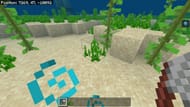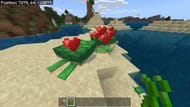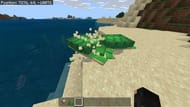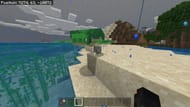- Create Wiki Page
- All Pages

Turtles are passive mobs in Minecraft that wander aimlessly throughout the world but can survive underwater indefinitely. They are usually found swimming in oceans and near beaches, and spawn in groups of up to 5 on sand blocks in the overworld with light levels higher than 8. They are slow on land, but can swim quickly; therefore, they generally prefer to be in the water and only move towards beaches to spawn eggs. To breed turtles, feed each turtle seagrass until hearts appear above them. After breeding concludes, one turtle will start digging in the sand and lay eggs.
Turtles have some unique drops that require breeding so locating some turtles can help you approach the dangerous environment underwater.
| Health | Behavior | Drops |
| 15 full hearts | Passive | 0-2 Seagrass; 1-3 XP orbs 1-7 after breeding; 1 Bowl if killed by lightning; 1 Scute if a baby grows into an adult |
Turtles will spawn on sand blocks in the overworld with light levels higher than 8 on the Java edition and 7 on the Bedrock edition. Turtles will remember where they spawned and will return to their home beach to lay eggs. Turtles will spawn in groups up to 5 in the Java edition, and in the Bedrock edition, they will spawn in groups of 2-5.
Killing a turtle will drop 0-2 seagrass and 1-3 XP orbs. If the turtle is killed by lightning they will drop 1 bowl. Turtles will not drop their shells unless a baby turtle grows up to become an adult turtle.
Turtles will wander aimlessly and can swim indefinitely underwater. Classic to turtle behavior, they will move slowly on land but can swim quickly. You cannot use a lead on turtles to transport them, but you can get their attention with seagrass. Turtles will generally prefer to be in the water and only move towards beaches to spawn eggs. Keep any turtles you want to own fenced in and blocked off as many mobs will target baby turtles and attempt to trample their eggs.
Turtles will remember the block they hatched on and treat that block as their home. No matter how far a turtle travels it will always attempt to return to its home beach to lay eggs. If you move a turtle egg with silk touch to a new location, the resulting baby turtle will treat the block you placed it on as its new home beach.
To breed turtles you will need to feed them seagrass. To find seagrass dive into a non-frozen ocean biome and use shears to gather some seagrass.

You can have turtles follow you by holding a block of seagrass in your hands, but an easier way to ensure you have turtles that will return to where you want is to gather the eggs yourself and place them where you want them. Feed two turtles seagrass and they will make sea turtle eggs.

After they come out of love mode one of the turtles will seem a little larger than the other. After a few seconds, it will dig in the sand to lay its eggs.

When it is done digging in the sand it will lay its egg after a few moments.

You can retrieve this egg with a silk touch tool. Before the egg hatches, it will appear to be cracked. This means it has advanced a stage in hatching a baby turtle. Turtles are more likely to hatch at nighttime.
Zombies will attempt to crush sea turtle eggs and foxes, wolves, and ocelots will attack the babies that spawn from eggs. Even the player can crush sea turtle eggs so approach them carefully. Keep them in a safe place or else you may face an unfortunate accident.
Baby turtles are the smallest mob in the game! This means that when they are on soul sand they can suffocate in the block. There is a lot of dangers for a newly hatched turtle so if you are looking to get the turtle scutes they drop, go the extra mile in keeping them safe.
While turtles prefer the water, they do not need water in order to survive. A turtle without water will simply roam and wander aimlessly. They will seek out nearby water if there is a valid path. You do not need water in your turtle enclosure to keep them alive, but it will look nicer to see turtles swimming every now and again rather than keeping them entirely on land.
While they certainly look small enough to fit through the gaps in a fence, the fence is a solid block. The baby turtle cannot move through the fence. A wolf will not aggro onto a baby turtle fully enclosed in fence blocks. Foxes can jump a single fence block so keep foxes away from your baby turtle enclosures.
A pregnant turtle will be a little larger than regular turtles. Compare it with the other turtle you bred it with in order to determine which one is the pregnant one. Alternatively, you can wait until it reaches its home beach to see if it starts digging a spot for an egg. Only a pregnant turtle can be seen with this behavior, if you see sand particles flying you know which one is pregnant.
A turtle that grows from a baby turtle into an adult turtle will drop a turtle scute. You can craft five of the scutes into a turtle shell that you can wear as a helmet. This helmet will provide you with a few seconds of water breathing when you enter the water and can be brewed into a potion of the turtle master.